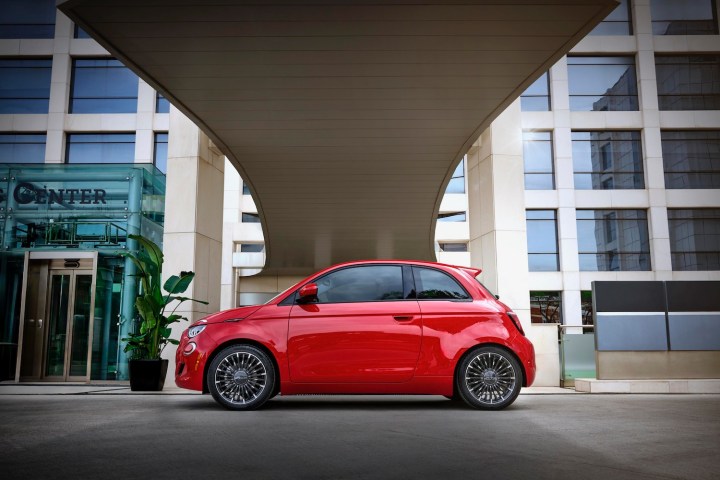
Stellantis is partnering with California-based startup Ample on EV battery swapping, potentially allowing EVs to swap depleted battery packs for fully charged ones in just a few minutes.
On Thursday, the two companies announced a binding agreement to blend Ample’s battery-swapping tech into Stellantis EVs. That will start with a fleet of 100 Fiat 500e hatchbacks that will be deployed by Stellantis’ Free2Move car-sharing service in Madrid in 2024. Ample currently has four battery-swapping stations in the Spanish capital, with a advance nine planned, CEO Khaled Hassounah told Digital Trends and other media in a virtual roundtable. advance plans weren’t discussed, but it’s worth noting that the 500e is coming to the U.S. in 2024 as well, and Free2Move is already active in a few U.S. cities.
Founded in 2014, Ample aims to succeed where numerous past battery-swapping services failed. It aims to do that with small battery modules that exchange a vehicle’s original battery pack without any reengineering of the vehicle structure and swapping stations that can be deployed in as little as three days, Ample claims. Once parked at a station, the driver initiates a swap via an app, and the vehicle gets a new battery in less than five minutes. Existing vehicles can’t be retrofitted with Ample’s battery modules, though.
Ample has primarily worked with fleet operations so far, applying its tech to Nissan Leafs for Uber in San Francisco, as well as Fuso eCanter commercial trucks. Those applications, along with the Free2Move car-sharing service, are likely an easier fit for a service that requires EVs to use dedicated batteries. However, Fisker also announced earlier this year that its Ocean electric SUV would get swappable batteries from Ample in 2024, likely for retail customers. Stellantis is also considering offering battery swapping to its retail customers, likely starting with the 500e, Ricardo Stamatti-Avila, senior vice president of Stellantis’ charging and energy business unit, said.
Battery swapping promises the same convenience as filling up a car with gasoline, but it’s proven challenging to execute. Just over a decade ago, another startup called Better Place crumbled after trying to launch a battery-swapping service in Israel. Tesla also tried and quickly rejected the idea after building just one swapping station. Ample’s approach is a bit different in that its stations swap out battery modules one by one rather than the battery pack as a whole. This means the stations are less complicated to install, and the tech can be adapted to different vehicles more easily, the startup claims.
Other companies are still pursuing the idea, though. Chinese automaker Nio has a large battery-swapping network in its home market, and it is now expanding to Europe. Last year, battery maker CATL launched its own battery-swapping service called Evogo.
Editors’ Recommendations

